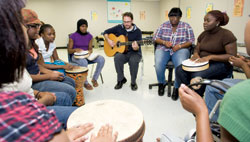High School students experience the healing power of song
Arts and Quality of Life Center helps youth cope with stress through creativity
| It’s nearly dismissal time at Carson Valley High School, and students at the Flourtown alternative education school begin to stream for the exits. But one group of young women remains behind. Gathering in an empty classroom, they form a loose semicircle and, accompanied by acoustic guitar, begin to sing. The girls are participants in the Hear Our Voices program, an innovative music therapy project developed at Temple that aims to promote positive attitudes and behaviors in at-risk youth. Through creativity and song, participants learn to express their emotions in a healthy way. |
 Photo: Betsy Manning/Temple University
Participants in the “Hear Our Voices” program at Carson Valley High School learn to express their emotions through written lyrics and song.
|
|
"Music evokes emotion through a non-threatening medium," said Mike Viega, a Ph.D. candidate in the Boyer College of Music and Dance. "Music speaks to one's experiences, challenges, passions, fears and hopes. It also breaks down resistance and allows therapists to address emotions and behaviors that might not be as accessible through traditional therapy approaches."
Developed by Joke Bradt, assistant director of Boyer’s Arts and Quality of Life Research Center, the 14-week songwriting program began in 2007 at the Hancock St. John Learning Center, in Philadelphia’s Kensington South section. Previous programs have focused on elementary students, but this year, Temple music therapists are working with adolescents at Carson Valley, which serves students with behavior and emotional troubles. “Hear Our Voices has been a very successful program with different age groups,” Bradt said. “Songwriting provides great flexibility to address the in-the-moment needs of the youth, and kids usually respond positively to an environment that allows for spontaneity and creativity. This program allows for their voices and opinions to be heard.” Program staff members work with the group of students to produce music and lyrics that reflect their personal challenges. The lyrics address themes that deal with strength in facing obstacles and unity among women. In one song written by the group, a student, whose stage name is Reality, sings: “After all the trials and tribulations too, I finally have the courage to make it through. So I wipe the tears from my eyes and recite these four words: ‘yet, still I rise.’” “I am so impressed with the strength of each of the students for overcoming and surviving their struggles,” Bradt said. “Their songs reflect this in many ways. Though they mention the struggles, each song is hopeful as well, which is amazing to witness.” |
|